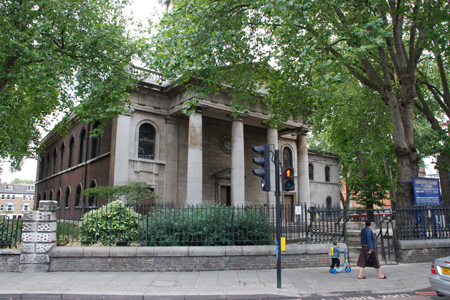| |
 |
 |
 |
| The story so far... |
 |
| You're currently on our features and projects pages, with material ranging from the satirical to the theological. For more features, click here. |
| |
|
|
| Revving up comedy |
 |
 |
 |
| Rev, the acclaimed BBC Two sitcom which focuses on the uneven pilgrimage of Reverend Adam Smallbone (played by Tom Hollander) in his inner city parish of St Saviour in the Marshes, screens its final episode this Monday. Ship of Fools editor Simon Jenkins talks with James Wood, the series writer and co-creator, about the show's uncanny accuracy about church life... and Adam's visit from a mystery reviewer. |
 |
Warning: contains some plot details.
Faith and comedy make interesting bedfellows... after all, the crusades, the inquisition, jihad and all that are seriously unfunny. Why did you go for religious comedy?
The idea came about because Tom Hollander spotted a newspaper article a couple of years ago about supposedly "the most powerful vicar in Britain". He was a vicar in west London, who because of the highly-regarded Church of England school in his parish suddenly had a packed congregation, full of what was largely the then shadow cabinet. This vicar was the most invited man in London.
Tom phoned me up and said, "Look at this hypocrisy! This is brilliant and hilarious, and no one's done the church like this."
We started doing research and hanging out with vicars, but we broadened out very quickly beyond the initial idea, which was to do a hypocritical, social climbing vicar. If you start spending any significant amount of time with vicars, you soon realise that the breadth, strangeness and uniqueness of the role is far more interesting than our first idea. Most people, I think, don't have a clue about that, as we rather take the church for granted. It's such a part of our cultural fabric that people assume they know how it works, but I don't think they do. So once we started spending real time with vicars and saw what their daily lives involved, we realised there were a lot of incredible stories.
I think one of the things that has made Rev compelling comedy is the mixture of city grime, fallible characters, desperate situations, with the main character sincerely trying to do good. It's a very human and true mixture.
There's a rich vein of clerical comedy, obviously, and we were very keen to make it authentic again – and put some religion back into it. That came about because Tom Hollander and I spent a year with a variety of vicars going to church. It wasn't originally our intention to put religion back into comedy, but if that's the world you investigate and if you do that level of research, you soon feel the desire to do that.
Father Ted and The Vicar of Dibley are probably closest to what you're doing, but they're caricatures, whereas you've gone for realism. How did you shape Rev in relation to them?
The short answer is we wanted to take everything people love about clerical comedy and bring it into town and make it 21st century, up to date and authentic.
Were you aware of the Vicar of Dibley and Father Ted looking over your shoulder?
Yes. Father Ted is very funny, but Catholic, surreal and silly. Dibley is hugely popular, very funny, but rural and not really interested in the business of the church or particularly the vocation. We felt that no one has really done a show that explores the real joys and frustrations of what it's like to be a frontline vicar – and explored it with a real sense of authenticity, trying to get the smell of it right.
There's a big difference between being an urban vicar and a rural one. If you're an urban vicar, the range of people you're going to encounter is extraordinary, I can't think of any other job where you'll encounter such a wide range, from the lost, loney and disposessed, up to the social climbers at the top – they get everybody. And also, no comedy show has done the business of what it's like to manage a church, or looked into the church hierarchy.
You've got quite a long list of revs in the credits acting as consultants. What did they bring to the party?
They helped generate storylines, and also gave us lots of their anecdotes and jokes. They helped us make sure the characters were credible in terms of the sort of people vicars regularly encounter. The cassock-chaser, for example, and the drug addict constantly at the door wanting to use the loo – that all came from them. We also used them to make sure we were authentic in terms of phraseology, the correct scarf you wear in Lent, and they helped Tom make sure he perfomed the sacrament correctly – all that kind of stuff.
There's a sort-of connection to our Mystery Worshipper project in the final episode. What's that about?
Well, the final episode is kick-started by Adam, the Rev, getting a bad review for his sermon from a website we've called Godslot. It's not Ship of Fools, I hasten to add, but it's "an irreverent Christian website". They give him minus one for his sermon.
Adam is devastated and it plunges him into a crisis about his vocation. But to be fair, it's not just that. He's had a terrible, terrible day, and the final straw is the fact that the reviewer comes on the one bad sermon he's done all year, and he thinks, "Why do I bother, why do I do this?" He has a proper crisis of faith. I think it's the best episode by quite some way. It's quite dark, but also I think it's the funniest – they're probably linked – and the ending is quite moving.
When we were writing the epsiode, we knew we wanted our vicar to have a crisis. So we were trying to come up with things that might instigate that, and asked vicars what that might be. We came up with three ideas. Kids who don't even know what World War II is, and don't respect the dead. Atheist kids at a primary school asking annoying questions. And then for the final thing, one of the vicars said, "If my sermon got a bad review online, that would really annoy me." And a certain number of vicars find the anonymous card which I think you guys leave really annoying.
Oh, good.
They hate it. And I've given Alex a rant, which wasn't 100 miles off the sort of thing I was hearing from some vicars. The people who didn't like it said, "How dare they not declare their hand, not reveal who they are!" And I thought that's all quite funny. But it's true, you know: most hard-working vicars do work at their sermons, and then occasionally of course they don't. And if that was the one sermon your Mystery Worshipper came to, they would be really hurt. Most of them might pretend they wouldn't be affected by it and think they're above it, but one vicar we were talking to was very funny, and said, "No, I would be really irritated by that!"
Have you come out of researching and writing the show with a positive view of vicars?
Yes – I mean they're absolutely mad, poor things. But I have huge admiration for them, because you can never turn it off. Your door has to always be open, and it's a huge managerial and fundraising pressure. One vicar said to me – and it's my favourite thing that I was told – "I'm the only professional in my building. I have to depend on the service of a whole load of hopeless volunteers."
The thing that keeps coming across to me, watching Rev, is a genuine affection for the church.
I come from quite a churchy family. I'm a wandering, doubting person, but like a lot of us I grew up with a church childhood. And Tom's the same. Yes, we do have enormous affection for the church, even if we don't necessarily always believe in God. In that respect, someone said to me recently, "I love your show because it's not blasphemous, but it is heretical." I think that's right, because although we do sometimes attack the institution, we're not out to laugh at anyone's sense of faith, mystery or spirituality.
Read the Mystery Worshipper report of the Rev's dire sermon.
The final episode of Rev screens on BBC Two, Monday 2 August, at 10pm. |
|
|
 |
 |
 |
| Above: James Wood, the writer of Rev. |
 |
| Left: St Leonard's Church, Shoreditch, where Rev was filmed. |
 |
 |
 |
| Read the Mystery Worshipper report of the Rev's dire sermon. |
| |
|
|
|
|


